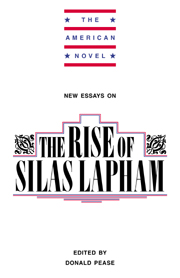Book contents
- Frontmatter
- Contents
- Series Editor's Preface
- 1 Introduction
- 2 Helpless Longing, or, the Lesson of Silas Lapham
- 3 The Hole in Howells / The Lapse in Silas Lapham
- 4 The Economy of Pain: Capitalism, Humanitarianism, and the Realistic Novel
- 5 Smiling through Pain: The Practice of Self in The Rise of Silas Lapham
- 6 The Rise of Silas Lapham: The Business of Morals and Manners
- Notes on Contributors
- Selected Bibliography
6 - The Rise of Silas Lapham: The Business of Morals and Manners
Published online by Cambridge University Press: 08 January 2010
- Frontmatter
- Contents
- Series Editor's Preface
- 1 Introduction
- 2 Helpless Longing, or, the Lesson of Silas Lapham
- 3 The Hole in Howells / The Lapse in Silas Lapham
- 4 The Economy of Pain: Capitalism, Humanitarianism, and the Realistic Novel
- 5 Smiling through Pain: The Practice of Self in The Rise of Silas Lapham
- 6 The Rise of Silas Lapham: The Business of Morals and Manners
- Notes on Contributors
- Selected Bibliography
Summary
The Rise of Silas Lapham has always been and surely will continue to be William Dean Howells's most available work, the work that connects him to the larger world of readers. There are of course other Howells novels that will be candidates for the position. Some will claim the earlier A Modern Instance as the essential Howells; others will find in the later A Hazard of New Fortunes a gravity of social consciousness that gives the novel a weight lacking in the earlier work. In light of Howells's voluminous production, minority candidates will inevitably be advanced. Some few will opt for Annie Kilburn or The Minister's Charge; and there will no doubt be a few who enter pleas for The Son of Royal Langbrith or The Landlord at Lion's Head. Then too there will be advocates for Indian Summer as evidence that Howells could hold his own with James in the international scene. Lionel Trilling went so far as to single out The Vacation of the Kelwyns as an example of his resilient strength. Yet anyone reflecting upon Howells's fate knows that none of these minority candidates – not even A Modern Instance or A Hazard of New Fortunes – will ever challenge the preeminence of The Rise of Silas Lapham.
There was a time, even in my memory, when The Rise of Silas Lapham was standard reading in the high schools of the land. It represented American literature in novel form just as Silas Marner represented English literature.
- Type
- Chapter
- Information
- New Essays on The Rise of Silas Lapham , pp. 107 - 128Publisher: Cambridge University PressPrint publication year: 1991



